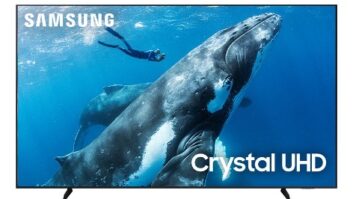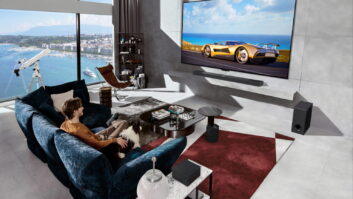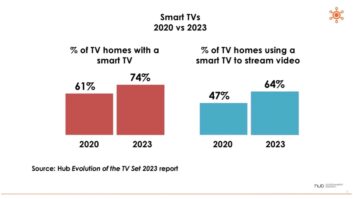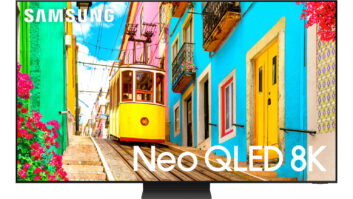With the February 2009 digital TV transition looming, HDTV suppliers are expecting a good fourth quarter and hoping for a minimum of price cuts along the way.
That is what executives with LG Electronics, Sharp, Toshiba, Mitsubishi and JVC had to say during the Nationwide Marketing Group’s PrimeTime! meeting, held here Aug. 17-20, at the Mandalay Bay Resort. (For more Nationwide coverage see p. 18.)
And along with their optimism about fourth-quarter sales of HDTVs, they expressed support, and some concern, about the state of Circuit City during this critical sales period.
Scott Ramirez, Toshiba’s TV marketing VP, indicated that his company will be rolling out a major introduction of HDTVs during CEDIA Expo in early September with increased features (see story, above).
While that will be good for Toshiba, he said that overall demand of HDTVs will be strong in the fourth quarter. And he does not see much in the way of traumatic price cuts. “There will be price reductions for all suppliers as panel costs go down. But that is expected across the board, so it should not affect one [supplier] over another.”
Concerning Circuit City, Ramirez does not see its problems forcing the chain to dramatically cut HDTV prices. “At least I hope not. They have to balance volume and profit … and to rely on price won’t help.”
On Circuit City’s condition and what it’s future means to the CE industry, he said: “It is a lot better for the industry if we have a strong Circuit City. We need a variety of retailers. Circuit City, other national chains and independent retailers give the industry and consumers a variety of options.”
Steve McNally, consumer electronics sales VP, LG Electronics, reported that HDTV sales “have been good for us” recently and that LG “is meeting [its] sales goals, which means we are outpacing some with our growth.”
McNally does not expect shortages during the fall selling season because there should be enough manufacturing capacity for the industry. “We’ll be in good shape,” he noted.
“Fourth-quarter sales will be good,” McNally noted. “When times are tough consumers cut back on vacations and other things and stay home. They turn to CE. With the DTV transition deadline it presents the industry with an opportunity.”
McNally thinks that the trend continues to be that consumers are “replacing the main set of the house and moving the older unit as a second or third set. The main large-screen TV is still the key.”
And he commented on Circuit City by saying, “They would be reluctant to [cut prices] because they need larger margins.” And he echoed a common theme by saying, “We are light on retail competition right now with Circuit City. We need Circuit City more than ever.”
John Woodhull, sales director of Sharp’s audio/video division, agreed with McNally’s point about the “staycation” trend. “We have seen increased sales of HDTV and A/V products” as families spend some of the money they would have spent to go on vacation this summer.
Woodhull is optimistic about Sharp’s D65 series of LCD TVs for the fall and said, “Not just Sharp but the industry is pointing to strong demand for HD for the balance of the year,” due to product performance and reminders to the consumer about the DTV transition looming in February.
Max Wasinger, sales and marketing senior VP for Mitsubishi, has seen growth and expects continued good sales for DLP and flat-panel TVs as the fall season approaches. He expects, “No problem with inventories,” but there might always be “occasional spot shortages.”
He noted, “There are strong sales for HD at retail,” but the problem is that “volumes may be up, but profits are still challenged” and that retailers must still get “footprints into their stores.”
Wasinger said that Mitsubishi, which showed its 3-D DLP package, immersive-sound LCD TVs and its LaserVue HD DLP line, here, is a “niche player” that provides “value-added products,” which is why the company values a diverse retail channel.
In commenting on Circuit City, Wasinger noted that Circuit City “makes our business competitive” and that Mitsubishi “values our relationship” with the chain. “We want [Circuit] to survive and thrive. We don’t want [the industry] to rely only on a couple of national accounts. We also need local and regional retailers too.”
Keith Ido, buying groups VP of JVC, is also optimistic about the fall selling season and mentioned his company’s CEDIA Expo offerings. “I think it will be a good fourth quarter due to greater consumer demand. For us we will be showing front projectors and LCD TVs during CEDIA [Expo] which should generate more interest in our line.” He added that in his opinion Nationwide “continues to do very well in HDTV” and in CE overall.
Speaking of Nationwide its executives also volunteered their opinions on how a possibly weakened Circuit City may affect HD and overall CE pricing and sales during the second half.
Jeannette Howe, executive director of Specialty Electronics Nationwide, said, “Best Buy is the [CE] leader in the mass market. Circuit City has become a reactor. Most will follow what Best Buy does. Unless Best Buy reacts to what Circuit City might do [in terms of pricing], any move Circuit might make won’t have an impact.”
When Ed Kelly, president of Nationwide, was asked about Circuit City he said its competitive condition “will have a lesser impact on the marketplace” and that “Wal-Mart, Sam’s Club, Costco have more of an opportunity to disrupt” fourth-quarter pricing.
If Circuit City does have its problems going forward, and it or any of the other national retailers Kelly mentioned have that potential, Les Kirk, executive VP of Nationwide, pointed out that “even Best Buy tries to provide more service. Independent dealers still provide excellent service, and more of it, to consumers. That is vital in this business.”
Of course, veterans of this business know that even when demand is high and the technology is excellent, as it is in this case, the industry always finds ways of cutting prices and profits.
LG’s McNally noted that in HD this fall, “We have great technology, good demand which makes for an excellent opportunity.” But, he said with a rueful smile, “it is still the CE business, so I’m a little fearful.”













